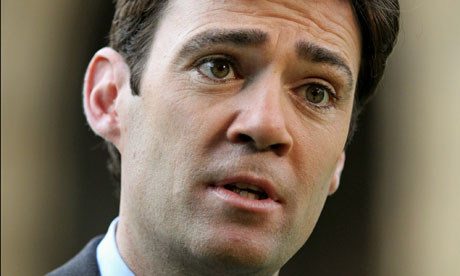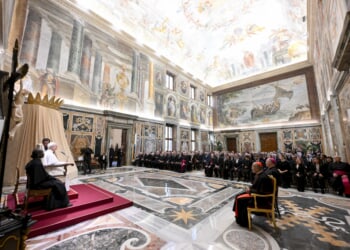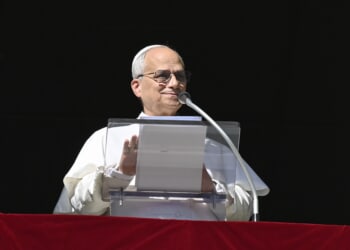Alexandra Vivona is a family lawyer based in London. She is a grassroots activist and comments on US and UK politics.
Some men are born to lead, some achieve leadership, and some spend their lives circling the car park, prodding Ford Fiestas with the toe of their shoe. Andy Burnham, Mayor of Greater Manchester, has perfected the latter art. If there is a political equivalent of loitering outside a dealership with no intention of buying, Burnham has cornered the market.
From his early New Labour days, he presented himself as Labour’s wholesome everyman, football scarf draped, hair floppy, forever reminding us he was “from Leigh”. PR immaculate, optics perfect. Behind the grin, though, his ministerial stints produced more cautious nudges than roaring accelerations.
As a young MP under Blair, he embraced the New Labour brand, speaking of modernisation, education reform, and public-private partnerships, all with the polished earnestness of a man who had memorised the press release. As Culture Secretary, he threatened to regulate the internet, then retreated, a plan so bold it barely made it past the drafting table. As Health Secretary, he delivered slogans rather than reform, pledging to “restore the ‘N’ into the NHS”. Tyres tapped, bonnet lifted, engine never started.
Then came the leadership bids. In 2010, he was the northern alternative to the Milibands – a campaign built on stating his postcode and looking vaguely available. Fourth place. By 2015, he tried again, sleeves rolled, voice husky, earnest. Hubris clashed with hesitation. On welfare, immigration, austerity, he hedged in three directions at once. Jeremy Corbyn, at least willing to drive, surged ahead. Burnham polished mirrors, left in the dust. As ever, he looked good in photos.
The whole routine has a distinctly Roman air. Marcus Crassus, the richest man in Rome, spent years strutting about the Forum, promising he would one day match the glory of Caesar and Pompey. He was the archetypal chariot-kicker of antiquity, circling his ambitions, inspecting the wheels, until at last he took the plunge and drove into Parthia. His maiden voyage ended in disaster at Carrhae, with Crassus himself extinguished along with much of his army. Burnham may not share the wealth of Crassus, but he has perfected the same talent for polishing the vehicle of ambition while never quite daring to race it.
His mayoralty has been his finest showroom yet. Workers jacket, staged press conferences, the ‘King in the North’ imagery. During Covid, he posed as a northern warrior, fists clenched at Westminster. The photos were magnificent. The follow-through was less so. Momentum died once the cameras left.
He has become a master of the “look decisive, act cautiously” genre, much as he was under Blair and Brown, projecting energy while waiting for someone else to push the accelerator. He now flirts with an organisation called of all names, Mainstream. You couldn’t make this up. No doubt he will be back on display at this year’s Labour Party Conference, perfecting the wave while avoiding the commitment.
Burnham’s caution has shown itself in local policy as well. His long-running deliberations over a Manchester congestion charge have been a masterclass in delay: proposals floated, consultations promised, deadlines extended, yet nothing every concretely materialised.
And then there are the economic gestures. Burnham has warned Britain must stop being “in hock to the bond markets”. Bold words, yet the markets are precisely where the billions for housing and transport come from. Threatening them does not get you the car, it just makes the salesman raise an eyebrow.
On taxation, he talks big – wealth tax here, higher council tax there, even a new levy to fund social care. Headlines love it: Burnham, scourge of the well-heeled. The fine print is absent. How to prevent capital flight? How to reassure homeowners their savings are not next? Questions hang while Burnham assures us the principle is sound. Now is not quite the right moment to start the engine.
The perennial “will he, won’t he?” question persists. Labour leadership speculation flares every few months. Burnham coyly replied to the BBC Radio Manchester: “It’s not up to me, that’s not my decision.” The showroom Audi all over again, admired endlessly, never bought, eternally desirable.
Burnham remains exactly what he has always been, a man never quite committing to the road. The cameras love him. Manchester tolerates him. Labour pretends to take him seriously. But for the rest of us, he is a showroom fantasist, a hero of potential, a master of promise, and, without question, Britain’s biggest political tyre kicker.









![Keith Ellison Caught Promising to Fight State Agencies for Somali Fraudsters [WATCH]](https://www.right2024.com/wp-content/uploads/2026/01/Keith-Ellison-Caught-Promising-to-Fight-State-Agencies-for-Somali-350x250.jpg)







